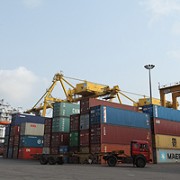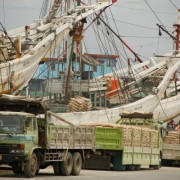Archive | March, 2013
Governance and public sector management
 Industry and trade
Industry and trade
 Industry and trade
Industry and trade

Have APEC Five been penalized for not achieving the Bogor Goals?

This is the first question I have met across at the ADBI seminar on APEC on January 28th. Of course they have not. Nobody raised this within APEC, because APEC is a non-binding organization. But so long as APEC sticks in its weak modality, it may get left behind mushrooming FTAs. What is the APEC’s raison d’etre nowadays? Established in 1989, APEC seeks to promote trade and economic cooperation in the Asia and Pacific region. In 1994 in Bogor, Indonesia, APEC leaders pledged to achieve free and open trade and investment in the Asia and Pacific region by 2010 for developed members and by 2020 for developing economies.
The PRC is not yet the world’s No. 1 trading nation

Since the People’s Republic of China (PRC) surpassed Japan as the world’s second largest economy in 2010, guessing when the PRC would eclipse the United States (US) as the world’s largest economy has been an exciting game among PRC watchers. On 10 February came the surprising news that the PRC had surpassed the US to become the world’s No. 1 trading nation, after both countries officially announced their 2012 trade figures. According to the US Department of Commerce, total US trade in 2012 amounted to $3.82 trillion, about $50 billion short of the PRC’s exports and imports of $3.87 trillion, estimated by China Customs.
Openness and infrastructure are key to growth in Indonesia

Slowing growth and rising unemployment sometimes induce economies to become more inward-oriented with restrictive policies. Indonesia shows early signs of such tendencies and its future growth may be at risk. The experience of high performing East Asian economies, however, suggests that outward-oriented policies and infrastructure investment support sustainable growth. Indonesia’s growth slowed to 6.2% in 2012 from 6.5% in 2011. Its growth in the previous decade was below 6%. A slight dip notwithstanding, a turnaround seems to be continuing in this resource-rich economy once seen by the West as a basket case of crony capitalism during the 1997–1998 Asian financial crisis.


Search
Subscribe / Connect to Asia Pathways
Subjects
- Agriculture and natural resources
- Blog
- Capacity development
- Climate change
- Economics
- Education
- Energy
- Environment
- Finance sector development
- Gender
- Governance and public sector management
- Health
- Industry and trade
- Information and Communications Technology
- Infrastructure
- Miscellaneous
- Population
- Poverty
- Private sector development
- Regional cooperation and integration
- Sanitation
- Social development and protection
- Transport
- Uncategorized
- Urban development
- Video Blog
- Water
Recent Posts
- Artificial intelligence: A new driver for inclusive growth and development?
- Increasing trust in cross-border e-commerce and artificial intelligence
- Enhancing access to maternal and newborn healthcare in developing Asia
- Can electric vehicles lead the way to a sustainable future?
- Mitigating climate-related sovereign risk to accelerate action on the climate emergency




Recent Comments